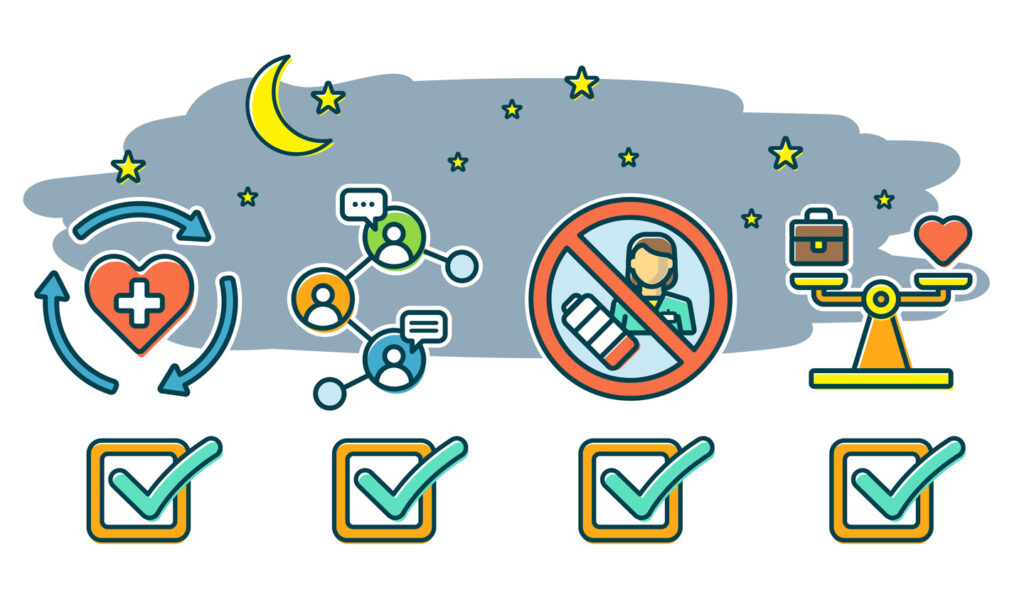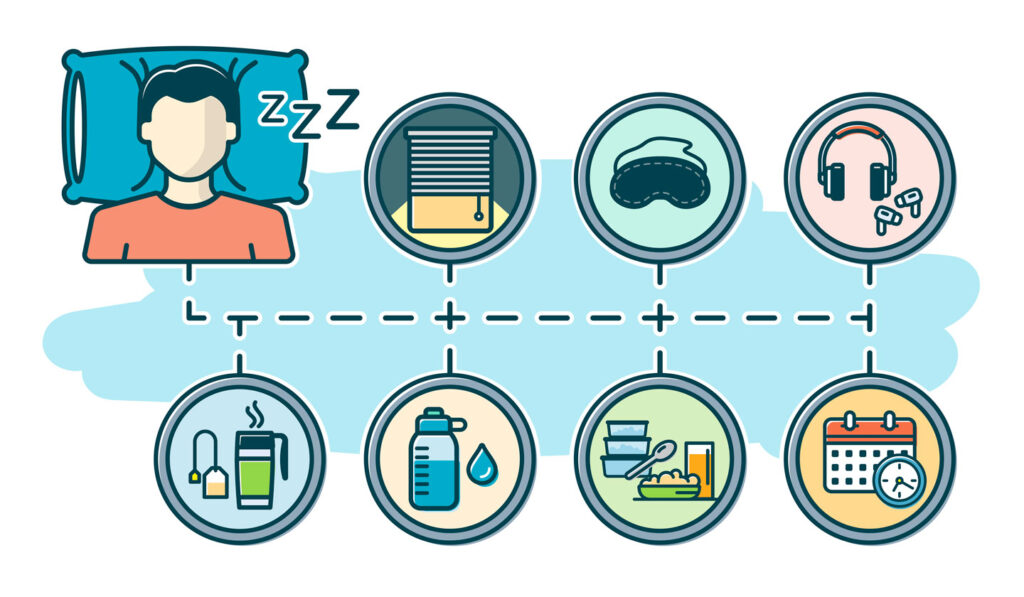Night Shift Nurse Essentials
| 7 Min Read

The 24/7 nature of health care means the need for night shift nurses will never wane. And many nurses find the evening shift to be an appealing, stable option. According to the Bureau of Labor Statistics, 4% of workers in the U.S. worked a night shift in 2017–18. Many of these workers are health care professionals, including night shift nurses.
So, what constitutes a night shift? Although the length and times of a shift may vary by employer, most night shifts last between eight and 12 hours and fall between 7 p.m. and 7 a.m. However, the unpredictable nature of nursing can sometimes cause scheduled shift times and lengths to fluctuate. Additionally, some nurses choose to rotate between overnight and daytime shifts.
If you’re considering building your nursing career by working the night shift, be sure to understand the challenges and opportunities associated with the shift before accepting a job offer. The shift requires some extra planning, but nurses who succeed in the distinctive role have unique possibilities for leadership and equip themselves with skills for advancement.
The Perks of Night Shift Nursing Jobs
The Journal of Nursing Education and Practice (JNEP) identified several benefits of being a night shift nurse. One includes spending time with family. In addition, daily tasks can be more manageable when they aren’t being done during the same hours as most of society. For example, less traffic and shorter waits when shopping and running errands prove huge benefits for busy professionals.
There are significant advantages for nurses working the night shift. Tricia Hunter, RN, said in Scrubs Magazine that she feels she gets to put more focus on patient care. “There’s more time to focus care on the patient’s needs instead of the needs of extended family members, who are often at home sleeping during the night shift,” she wrote in 2019. Hunter also pointed out that she builds better working relationships with her colleagues on the night shift since fewer people are working at the time.
In addition to helping you build close relationships with colleagues, working the night shift can help you stand out professionally. The autonomy that comes with the night shift, along with the many chances to showcase your time management and leadership skills, can lead to growth and opportunities that may be harder to attain while working the day shift.
Furthermore, night shift nurses are often part of the 12-hour workday model. This leads to a variety of health care and professional benefits. An article on RegisteredNursing.org highlighted the following:
- Continuity of care, leading to better patient outcomes and recovery
- Reduced communication errors
- Less burnout among health care professionals
- Healthier work/life balance
The night shift offers many positive professional and personal outcomes. Still, it’s important to acknowledge that it may be an adjustment that requires preparation.

The Challenges of Working Night Shift
Though there are several benefits, there are some drawbacks to the night shift. It’s not for everyone.
Working at night opposes the body’s natural circadian rhythms. As a result, some night shift nurses have difficulty achieving consistent, sufficient, and satisfying sleep. Even if there is substantial time to sleep during the day, the body often finds it difficult to fall asleep during hours when the sun is out. Plus, obligations during the day, such as childcare or appointments during business hours, can keep night shift nurses from getting adequate rest during their hours off. Proper support from loved ones is essential.
If you don’t get good rest while working the night shift, you may encounter adverse effects, many of which can make your role as a nurse more difficult. According to the Sleep Foundation, a lack of adequate rest can lead to:
- Slow thinking. Slow thinking can affect your ability to do your job properly, and quick thinking can mean the difference between life and death in some health care situations.
- Reduced attention span. The inability to focus can make simple tasks harder to complete, leading to added stress during a shift.
- Irritability, stress, and anxiety. If left unchecked, these mood changes can lead to long-term physical and emotional issues.
- Worsened memory. A memory decline can jeopardize the safety of patients and professional success.
- Poor decision-making. Fast decision-making is a pivotal skill in nursing. Preserving your ability to synthesize information quickly to make a potentially life-saving call is critical.
Chronic sleep deprivation can lead to cardiovascular disease, hormonal abnormalities, and mental health disorders, among other issues. Other reported disadvantages that arise from working night shifts include insomnia, increased risk of dangerous driving due to drowsiness, and a strain on familial relationships.
Even with challenges, many nurses prefer the night shift because it helps them maintain flexibility in their personal lives while positively impacting their patients’ well-being. Ultimately, working a night shift can be a rewarding experience for many nurses.
Tips for Night Shift Nursing
Ensuring that you have the support and self-care techniques to handle night shift nursing is key to thriving during the night shift. Follow these tips to keep yourself in peak shape while working the night shift:
- Create a schedule and stick to it, planning activities that support healthy sleep habits.
- Find ways to relieve stress to ensure that you get the best quality sleep possible.
- Exercise often. Even just a walk can help your ability to sleep and decrease your stress levels.
- Continue to pursue social activity and do things that bring you joy.
- Maintain a positive outlook and take advantage of the benefits of working the night shift.
To thrive as a night shift nurse, plan and ensure restful sleep. For a healthy rest routine, the CDC and National Institute for Occupational Safety and Health offer these tips for night shift nurses:
- Go to bed right after work. There is a short window of time before the natural circadian alerting mechanism will kick in to keep you awake.
- Sleep as long as possible. Because daytime sleep quality may differ from sleeping overnight, longer blocks of sleep ensure you get enough meaningful rest.
- Block daylight from disrupting sleep. Daylight triggers your body to wake up.
- Ask for support from friends and family members. Encourage loved ones not to disturb your rest before or after a night shift.
Selecting the right tools can help you maintain a healthy lifestyle while working the night shift. Consider:
- Blackout curtains in your bedroom
- A sleep mask to further block light and other distractions
- Noise-canceling headphones
- Melatonin at a low dose to help your body adjust to a different sleep routine
- A good travel mug for coffee or tea to help you stay awake throughout the night
- Meal planning containers to help you maintain a healthy diet
- A reusable water bottle to ensure you remain hydrated
- A detailed planner to keep your schedule prioritized for sleep and health

Working hours that are in opposition to the majority of the world’s activity, as well as your natural sleep cycles, can sometimes be difficult. Being intentional about your emotional and physical health and following these night shift nurse essentials will help you put your best foot forward and grow a promising career making a difference in the lives of others.
A Nursing Program That Works for You
Preparing for night shift nursing begins with the right education. Earning a bachelor’s degree in nursing will equip you with the leadership skills and industry understanding necessary for succeeding as a night shift nurse. The role is challenging, but it is also incredibly rewarding for those who are prepared and adapt.
Gain the knowledge you need to meet the demands and reap the rewards of night shift nursing with Methodist University’s online RN to BSN program. Our CCNE-accredited program for RNs provides the flexibility that working nurses need to earn a BSN. The program is asynchronous, so you can complete your courses at a time that works best with your nursing schedule, day or night.
A Methodist University BSN offers skills to help you in your career no matter the shift you work. You’ll graduate ready to advance into leadership positions, as well. In our program, you can balance work, personal, and school commitments with the support of experienced faculty and a dedicated online advisor. Interested in other health care degrees? Explore all the online health care programs we offer at Methodist University.